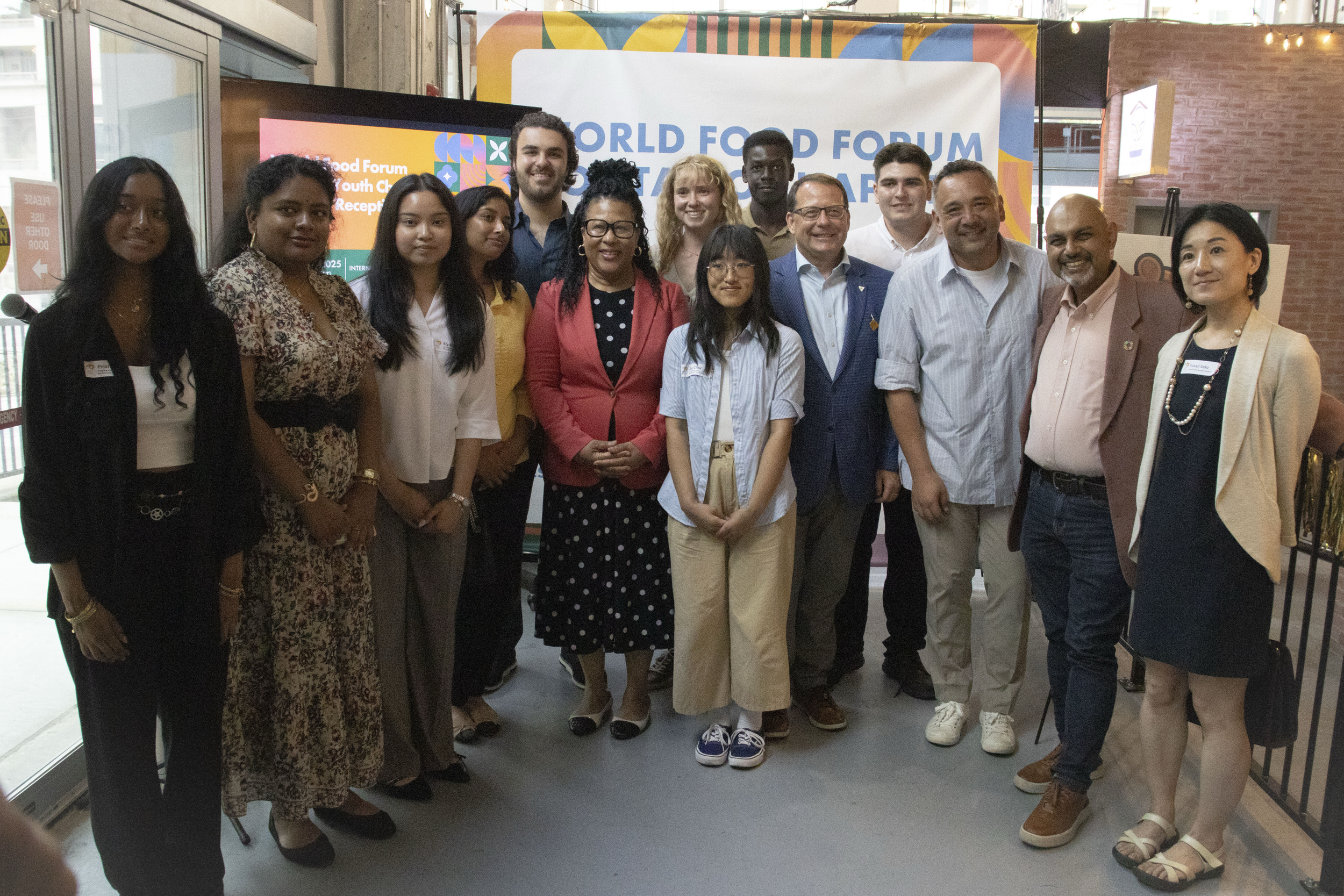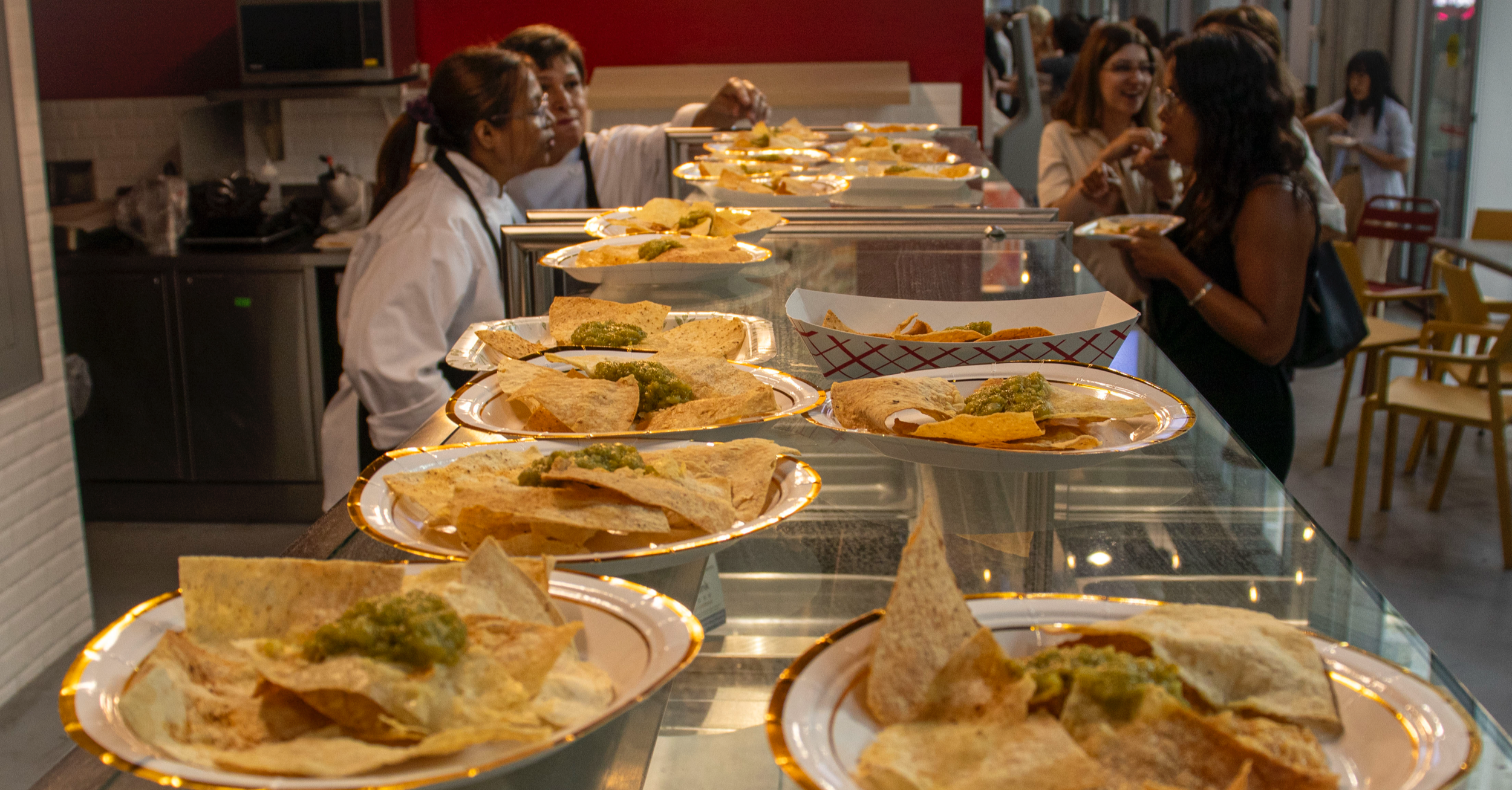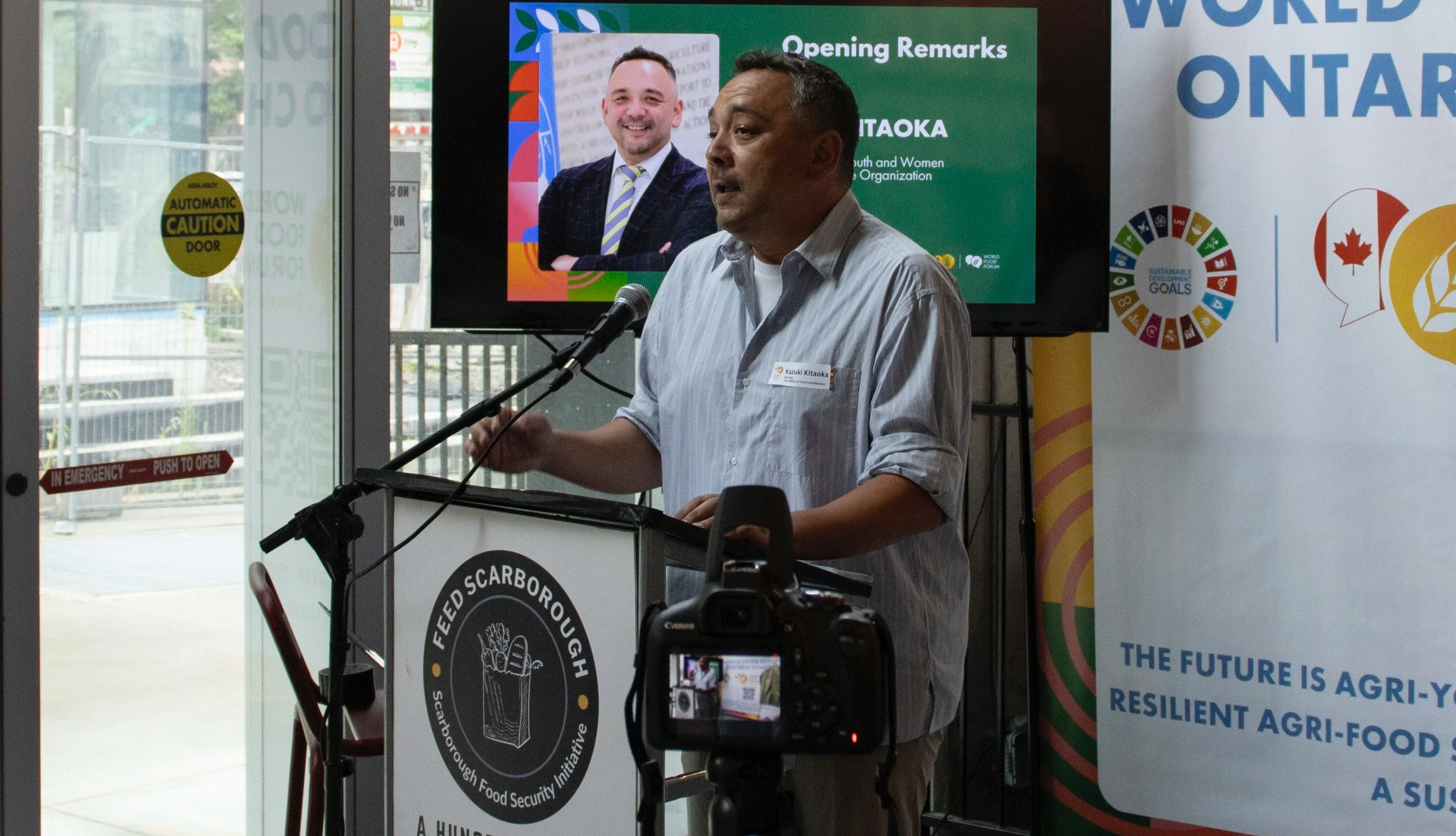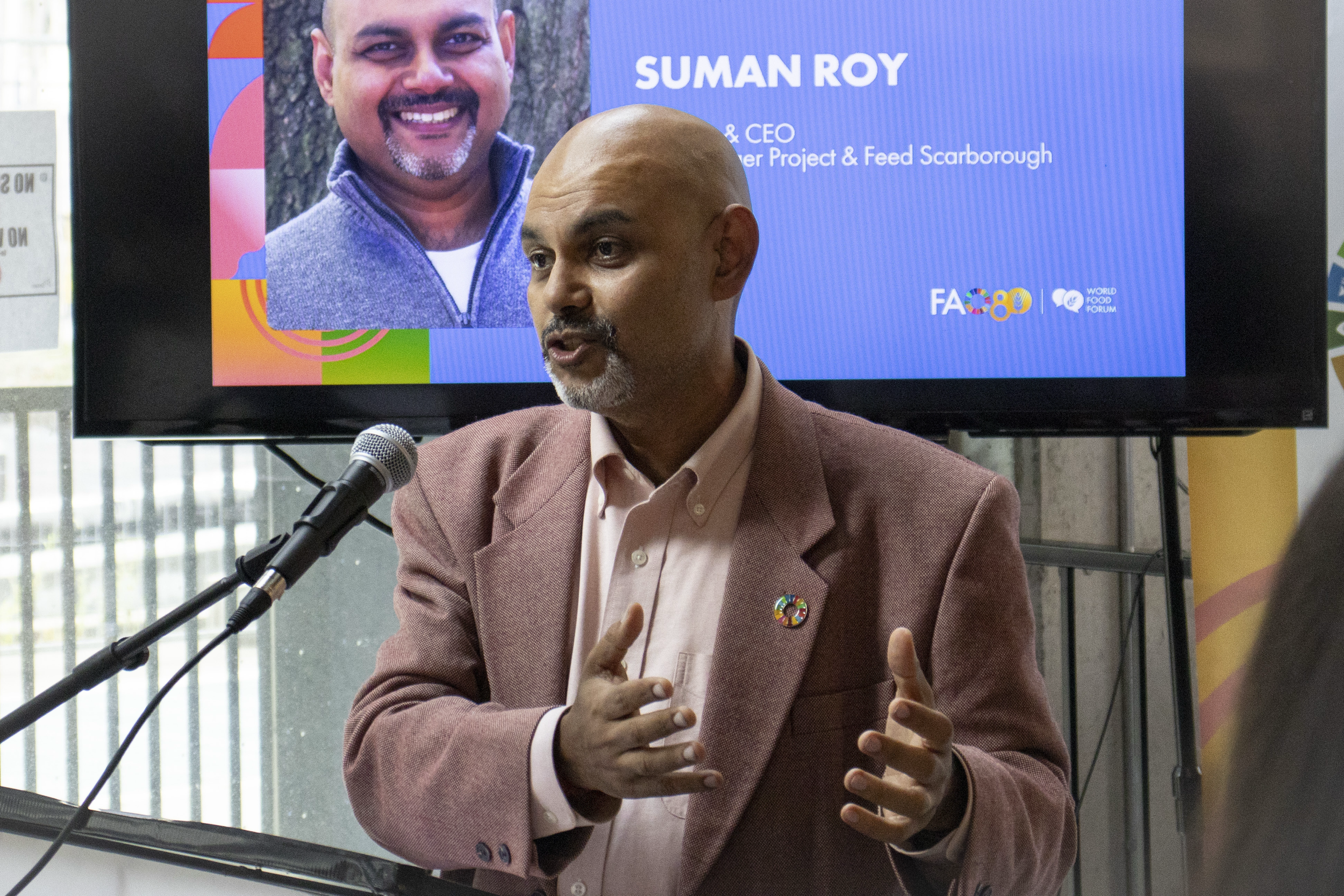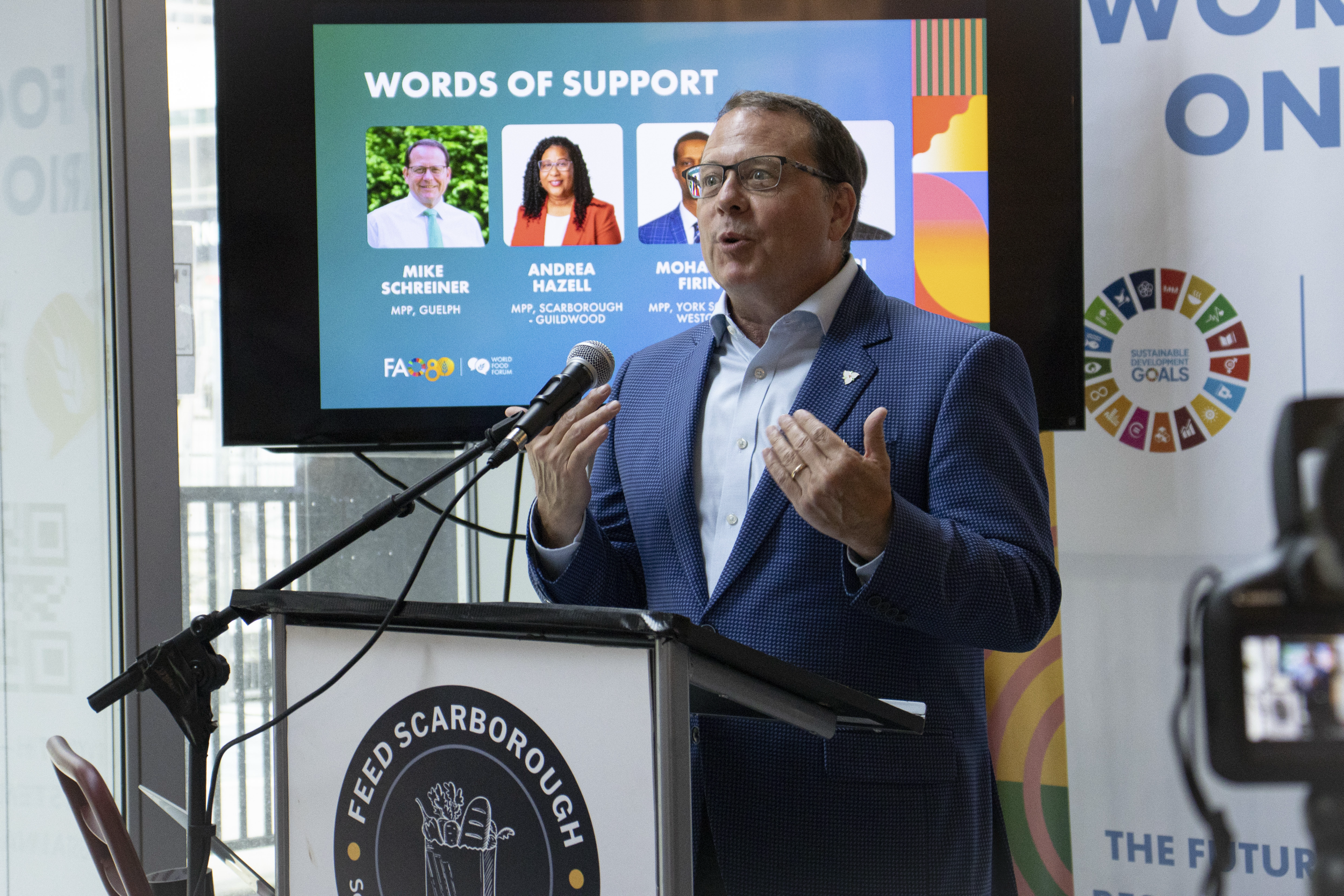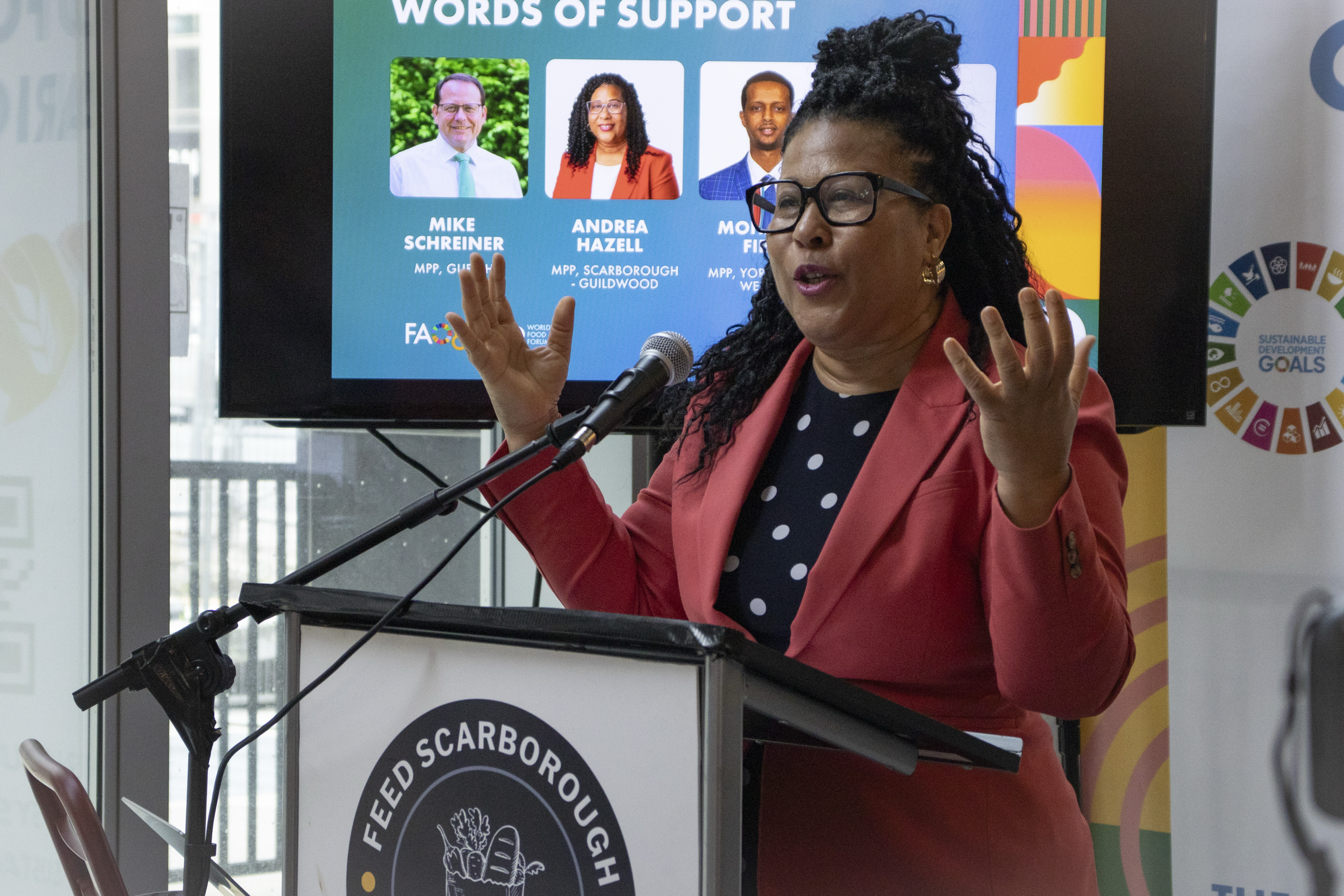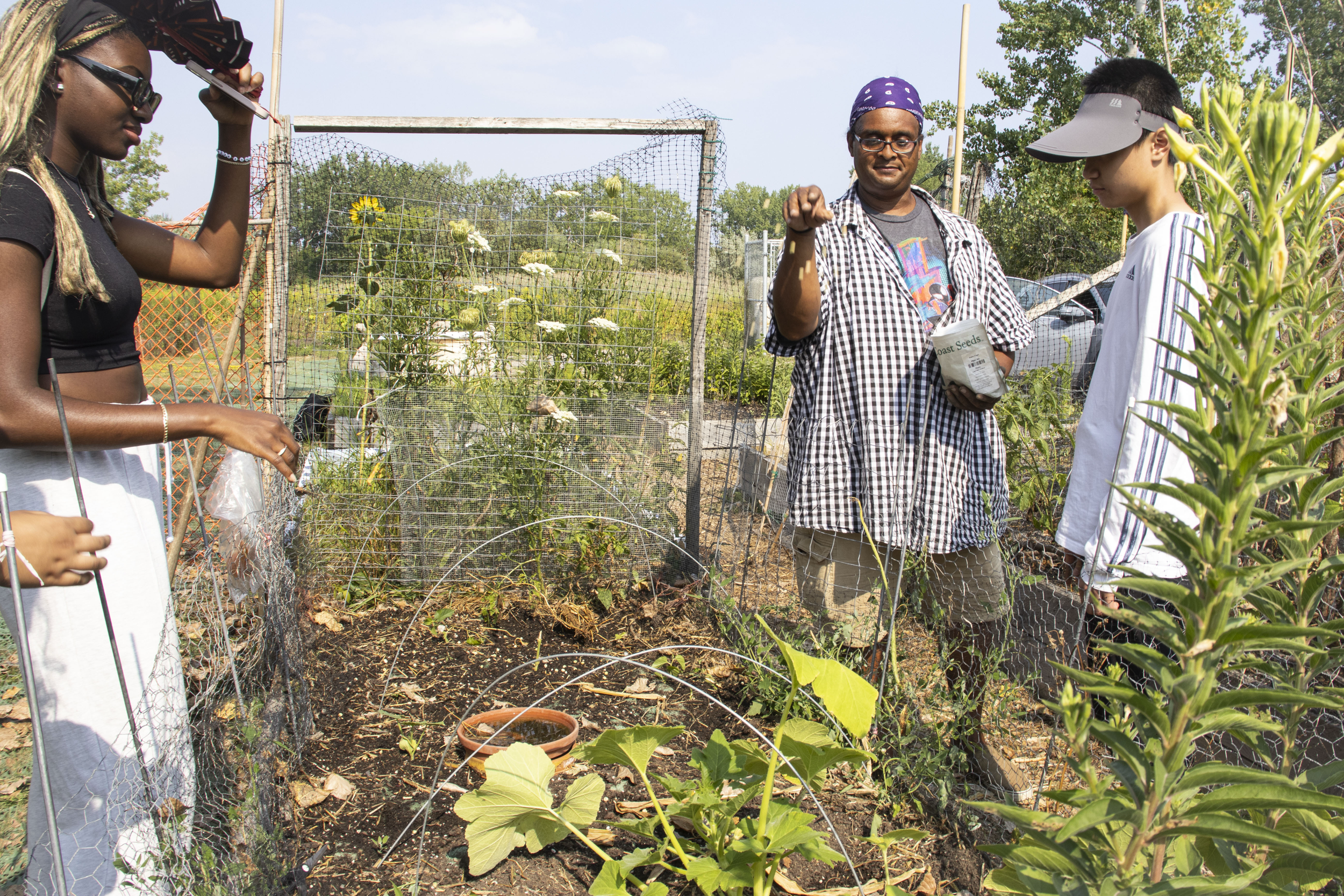World Food Forum kicks off its Ontario chapter led by team of UTSC students and alumni
The World Food Forum (WFF) expands to Ontario, its first chapter in North America, — made exclusively of UTSC students and alumni — with a launch reception featuring local and global leaders in food security
WFF Ontario chapter members, stakeholders, and supporters at Food Hall TO celebrate their official launch reception on August 12, 2025. Photo By: (Christian Zdravko // The Underground)
The World Food Forum (WFF) makes its way to Ontario with a team of UTSC students and alumni to lead the charge. The group celebrated their beginnings on 12 Aug. at Food Hall TO, where they held a panel featuring prominent guest speakers like Andrea Hazell, Scarborough—Guildwood MPP, and Suman Roy, founder and CEO of non-profit charity, Feed Scarborough.
The WFF Ontario chapter team currently consists of eight members. Four UTSC students; Jissana Ahad, Joy Choi, Prisha Dookie, and Kowmitha Satkunarajan, and four UTSC alumni; Henry Khamonde, Daniel Magnone, Amber McNeil, and Ely Ngo.
Suman Roy, Feed Scarborough CEO selling his book, The Zero Hunger Project: A Journey To End Global Hunger at the WFF Ontario chapter launch reception. Photo By: (Christian Zdravko // The Underground)
The WFF is a global organization under the UN Food and Agriculture Organization (FAO). The organization is focused on empowering youth participation in agri-food systems and working towards the achievement of UN Sustainable Development Goals (SDGs). Creating change through advocacy, policy and legislation is one of the WFF’s top strategies.
Kazuki Kitaoka is the director of the office of youth and women at the FAO, and the global coordinator of the WFF. He is based in Rome, Italy, and works at the FAO headquarters based in the same place. In 2019, when the FAO youth committee began, Kitaoka was invited to join. They soon envisioned expanding youth involvement, leading to the creation of the WFF, which held its first online gathering during the pandemic in 2021. After facing doubters who thought young people had no interests in the food and agriculture sectors, the WFF gathered over 20,000 online supporters in their first year.
“I think we proved them wrong at all levels,” says Kitaoka. Since then, the organization expanded by hosting in person events, and opening chapters around the world.
Chips & salsa served by local chefs at Food Hall TO at the WFF Ontario chapter launch reception. Photo By: (Christian Zdravko // The Underground)
Kitaoka says there are hundreds of thousands of young people in the world who want to contribute towards “a better food future,” through various industries, from agriculture, to fisheries, forestry, dairy farming, and food hospitality, spread across FAO’s many offices in over 130 countries.
The WFF also focuses on bringing young people to tackle the challenges relating to food sustainability and security so that they can look out for the next generations of people who will inherit the earth.
Kitaoka says long-term projects that don’t consider the perspectives of those who will experience it down the road are doomed to fail. “We want to have young people in the decision making for these long term investments, strategies, and policies, which are going to affect lives in the next 50 years,” he says, highlighting the importance of including Gen-Z in decision-making.
Kazuki Kitaoka, WFF global coordinator speaks at the WFF Ontario launch reception panel. Photo By: (Christian Zdravko // The Underground)
Agricultural, gastronomic, and other food-related industries are full of opportunities for youth to pursue careers in, according to Kitaoka. He argues that there is a need for more youth in these sectors to account for aging demographics and ongoing labour shortages. Back in 2021, the average age of Canadian farmers was 56. Furthermore, about one in nine Ontario jobs are part of the agriculture and food sector, hinting there are many ways youth can contribute to this field.
“I encourage everybody who is interested in any of those sustainability areas to have a look at the Youth Assembly and get engaged in those global discussions,” says Kitaoka about the WFF, which offers discussion groups ranging in topics from biodiversity in agriculture, to fisheries, to Indigenous perspectives on food systems.
Members of the group were inspired to join for different reasons. Dookie felt a drive to educate others about the way food works in our world. “I feel like a lot of people in the city, we don’t really think about how food ends up on our plates,” she says, who believes everyone should become more knowledgeable about food processes.
Khamonde felt inspired by community leaders like Suman Roy. McNeil found that food systems were at the intersection of many of her previous interests in environmental sciences, social sciences, and social justice, so she decided it would be a perfect place to apply her skills.
The group has a variety of ideas in mind for improving Ontario food systems. Khamonde believes education plays a large role. “We always focus on post-secondary education, but I think we have to start younger than that,” he says. McNeil offers another idea. She expresses her love for the app Too Good To Go, which allows users to purchase surplus food from stores and restaurants. Instead of disposing of the food, establishments can sell leftovers on this app at a discount.
After a question about the environmental effects of meat consumption, and whether or not a global shift to vegetarian diets would be environmentally beneficial for the world, Kitaoka said the answer is not so simple.
“For instance, let’s assume we all move from meat consumption to broccoli. That would perhaps be a sustainable option here in Canada, to a degree, at least. — Would it be necessarily a sustainable option in the United Arab Emirates, where everything is desert? No, and simply because the water production would be far too high, it would be a very unsustainable way forward for that country. Rather, they’re producing and consuming a lot of goat meat and sheep meat, which are animals that don’t need huge amounts of water, and are native to that land.”
He points to certain “Big Veg” industry practices, like the mass-cultivation of soy in Brazil, and how rainforests are destroyed in exchange for soy fields. “That is not a sustainable way forward.”
In the interview, Kitaoka ends with expressing his appreciation for the beautiful cow-filled pastures of Quebec. He points out that these cows exist because of a demand for dairy and meat, and these cows contribute to maintaining healthy, beautiful pastures through processes like fertilizing soil through manure, and stimulating plant growth through grazing. With cows playing a crucial role in the landscape management, raising cattle this way is a sustainable option, offering both nutritious food for humans, and healthy, scenic land.
These are the kinds of topics that the WFF deals with, and through it, they work towards solving some of the world’s pressing issues relating to food.
Suman Roy, CEO of Feed Scarborough, and a sponsor of the WFF Ontario chapter, has committed his life to creating a greater food future for the world, and was a panel speaker at the WFF Ontario launch reception. Along with his team at Feed Scarborough, they are driven to create a “hunger-free resilient Scarborough.”
CEO of Feed Scarborough, Suman Roy speaking at the WFF Ontario launch reception panel. Photo By: (Christian Zdravko // The Underground)
Last year, Roy attended the WFF flagship event in Rome. He noticed there were WFF chapters from all around the world, except for North America. Because of this, Roy decided to talk with Kitaoka and the FAO about opening a North American WFF chapter.
“The more voices we have, the better it is, because it is the youth who’s the future.” Following in Ontario’s footsteps, Roy says there are six more provinces working towards opening their own WFF chapter.
Roy believes one of the key differences relating to food security is that the West does not face problems relating to the amount of food, but rather access.
In the non-Western world like Asia and Africa, there are food shortage challenges, which lead to malnourishment amongst large portions of the populations.
On the other hand, Western countries waste billions of pounds of food each year. For instance, Canada wasted nearly half of its entire food supply, according to Canadian food rescue organization, Second Harvest Canada. Despite this, according to a 2024 report by the University of Toronto, over a quarter of Canadians living in provinces have lived in a food-insecure household. The goal for opening a WFF chapter in Ontario is to help tackle these kinds of accessibility issues in the province.
After some time, young people from around Scarborough stepped up to be a part of the WFF, contributing to Western food initiatives, and setting an example for the rest of North America. “My job is to just give them the support,” says Roy. He continues to encourage more youth to join forces with the WFF.
In a discussion about reducing Canadian food prices, Roy criticizes the “cheap food” system that has been normalized in North America. He argues that cheap food is often sub-quality, and with cheap food, the farmers who contribute to its production are underpaid. Roy says because farming is no longer as lucrative as it once was, there is less youth interested in taking on the jobs, opting instead for white-collar jobs in downtown Toronto with better pay.
“Cheap food is not the solution, it is having the right food,” says Roy. “The solution is to make sure that our communities have enough income to be able to buy the right food with the right price.”
One of Roy’s concerns about food culture relates to best before dates printed on products. “That is a marketing gimmick which increases food waste drastically. Best before date is not expiry. A lot of community members don’t understand. There are only a handful of items in our province and our country that actually have expiry.” There are foods that are safe to eat slightly beyond their best before date, and there are foods that may go bad prior to their best before date.
He suggests an alternative, where products label the manufacturing date instead, and the consumers would use their own judgement to determine whether or not it is safe to eat. Roy argues that being able to distinguish good food from expired food through senses like smell, taste, and sight is a valuable skill. Knowing this can prevent being misled by, or overrelying on best before labels, and can encourage greater food handling skills.
Green Party of Ontario Leader Mike Schreiner was also present at the opening. Schreiner spent his childhood living with his family on their cattle and grain farm in Kansas, U.S., and has contributed to local food industries throughout his whole life. After hearing about a WFF chapter opening in Ontario, he said he knew he had to show support, especially during a time of climate and environmental issues, and rising hunger levels in the province.
Mike Schreiner, Green Party of Ontario leader, and Guelph MPP speaks at the WFF Ontario chapter launch reception panel. Photo By: (Christian Zdravko // The Underground)
Schreiner is concerned with ensuring everyone in Ontario can access nutritious food. “One of the things that anybody who runs a food bank will tell you is they want to put themselves out of business,” he says. Schreiner also says he’s concerned about Ontario losing 319 acres of farmland per day to housing and infrastructure development, interfering with the province’s ability to feed its population. “Only five per cent of our landmass is suitable for growing food and less than one per cent is prime farmland, so we need to protect them so we can feed ourselves,” says Schreiner. He suggests keeping housing development within urban boundaries to prevent destroying farmland.
One strategy Schreiner suggests to improve Ontario food security is to raise income. He says he is working on doubling social assistance rates, and raising minimum wage in the province. Furthermore, he suggests upcycling food instead of wasting it, turning it into other products like juice or dried food, redistributing food to communities who would use it instead of disposing of it, and putting to use imperfect, or ugly produce instead of wasting it. Schreiner is also trying to ban organic waste in landfills because it can release methane into the air, and because that waste can be reused through enriching soil with nutrients.
Scarborough-Guildwood MPP, Andrea Hazell was another supporter and speaker at the WFF Ontario chapter launch reception. For a while, she has been concerned about families in her community not getting enough food.
She shares a touching story. “I was at the food bank and I was sharing the food, and I saw about 15 high school kids at the food bank collecting food for their dinner. Not for their lunch, for their dinner. — This is a wealthy country. We shouldn’t be living like this.” Hazell emphasizes the importance of education in raising awareness about these issues, and teaching others.
Andrea Hazell, MPP for Scarborough-Guildwood speaks at the WFF Ontario chapter launch reception panel. Photo By: (Christian Zdravko // The Underground)
Members of the group were inspired to join for different reasons. Dookie felt a drive to educate others about the way food works in our world. “I feel like a lot of people in the city, we don’t really think about how food ends up on our plates,” she says, who believes everyone should become more knowledgeable about food processes.
Khamonde felt inspired by community leaders like Suman Roy. McNeil found that food systems were at the intersection of many of her previous interests in environmental sciences, social sciences, and social justice, so she decided it would be a perfect place to apply her skills.
The group has a variety of ideas in mind for improving Ontario food systems. Khamonde believes education plays a large role. “We always focus on post-secondary education, but I think we have to start younger than that,” he says. McNeil offers another idea. She expresses her love for the app Too Good To Go, which allows users to purchase surplus food from stores and restaurants. Instead of disposing of the food, establishments can sell leftovers on this app at a discount.
Kowmitha Satkunarajan, president of the WFF Ontario chapter emphasizes the importance of understanding how food reaches individuals. “It’s not necessarily only about the price tag. — It’s about what happens to that food product from its conception all the way to landing on the shelves in the grocery stores.”
One of the WFF Ontario chapter’s first events after their launch reception was a panel at UTSC covering food integrity, open to students and non-students alike, featuring four women with advanced knowledge on the topic.
Dakota Cherry holds a Master of Science (MSc) degree from the University of Guelph in Family Relations and Applied Nutrition and was one of the speakers at the panel.
During the panel, she opened up about her relationship with food banks growing up, and the kinds of stigma associated with it.
“I grew up going to food banks and so I remember vividly the shame that we felt lining up. It wasn’t really a joyful experience. Everyone kind of has their head down. It’s not empowering. It’s not a solution,” says Cherry, suggesting food banks should be treated as a temporary solution rather than a permanent one.
She later discusses the innovative changes that Guelph — being a leading community in the agri-food sector — has brought to the table for food banks. “[Guelph] is like a hub for sustainable food solutions. We have the first ever sliding scale grocery store there, and it's been an amazing experiment that has turned into a little social enterprise. We also have Chalmers, which is a food bank that serves culturally relevant foods, like okra and rotis.” She also mentions food banks with client-choice models, meaning individuals are able to pick which foods are best suited for them, like they were in a grocery store, rather than receiving pre-packaged boxes.
After a robust panel discussion, the WFF brought the attendees of the panel on a tour of the UTSC Campus Farm, led by Afro-Indigenous agricultural expert, and community partner Isaac Crosby, and half-Indigenous sociology professor Danielle Kwan-Lafond.
Agricultural expert Isaac Crosby plants pea seeds at UTSC Campus Farm, where he serves as a community partner. Photo By: (Christian Zdravko // The Underground)
Throughout this engaging walkthrough, guests learned about agriculture and indigenous worldviews, while seeing, tasting, and smelling various plants like radishes, huckleberries, and the mouth-numbing Spilanthes.
Crosby acknowledges the mental health benefits — especially for students — that come with spending time on the campus farm.
“[Students] are under so much stress. I can see it, and I laugh at them, and I always tell them ‘wow, I don’t know what’s happening down there, but whatever’s happening on that campus is not going to be here. Trust me, for two hours, you’ll be happy and smiling. You’ll want to come back.”
With the amount of systemic issues found in Ontario’s food sector, the importance of understanding these food systems, and even the benefits that come with being a part of it, as seen at the UTSC Campus Farm, for example, the WFF seems to have a long, busy, and fruitful future ahead.
